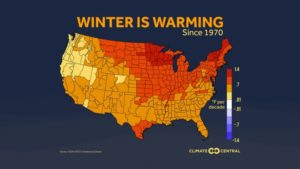
By Jeni Gregory, Minnesota Environmental Partnership
Minnesotans love to talk about weather. In recent years, winter brings a flurry of conversations about the shortage of frigid days and good old-fashioned snowstorms. While this week fulfilled some fundamentals of a Minnesota winter with plunging temperatures, wind-driven snow, and treacherous driving conditions, we started the week with record-breaking mild weather.
While it’s easy to speculate that Minnesota winters aren’t what they used to be, a recent report illustrates just how much temperatures are actually changing here. The report from nonprofit group Climate Central shows that winters are warming faster in the Great Lakes and Great Plains than anywhere else in the U.S. In parts of Minnesota, Wisconsin, and northern New England, winters have warmed at an average rate of more than 1 degree per decade since 1970. Mankato and Minneapolis ranked among the fastest warming cities with a 6 degree increase; Fargo is 5.9 degrees warmer and Duluth registered 5.8 degrees warmer.
Sean Sublette, a meteorologist with Climate Central, explained that the coldest places are warming the most because, “It takes less energy to warm something cold than it does to warm something already warm.” He added that’s why the Arctic and Antarctic areas are among the fastest warming on Earth.
In Minnesota, this warming has meant shorter seasons for snow and lake ice which has impacted businesses that depend on outdoor winter recreation. It means that pests like the Japanese beetle and emerald ash borer are more likely to survive winter, allowing for major attacks come summer. It’s also having an effect on birds’ migratory patterns and our state’s habitat and wildlife.
Warming trends are expected to continue, and the consequences are getting harder to ignore. While milder winters are appealing to some, climate change has increased catastrophic weather events across the country, including Minnesota. Please visit Climate Generation’s website for information on how you can take action on climate change.
The above is all the more reason we must fight against climate change.